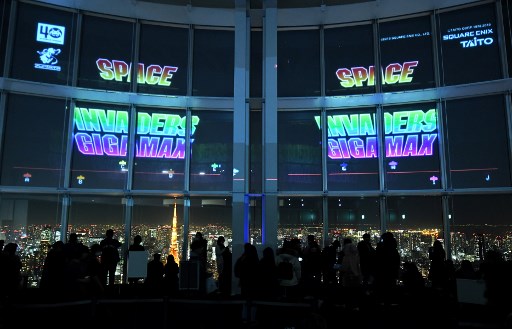
TOKYO, Japan (AFP) — Block graphic aliens dropped down the window panes of a Tokyo skyscraper before being blasted into oblivion by enthusiastic gamers celebrating 40 years of the arcade sensation “Space Invaders.”
Four decades after the game took the world by storm, a high-tech exhibition is allowing enthusiasts to save the world from extra-terrestrial invasion in a variety of novel ways.
Part of the installation sees the game projected inside the windows of a skyscraper’s 52nd floor, against the glittering backdrop of Tokyo’s night skyline.
Elsewhere at the “Play! Space Invaders!” exhibit, gamers interact more closely with their alien opponents thanks to motion-sensor technology that allows them to stamp or hit the invaders as they approach on the floors or walls.
And for those with a touch of nostalgia, the exhibit also features the traditional game machines that first tempted players in arcades and pizza parlours decades ago.
Father of two, Keiji Ishihara, 50, remembers the frenzy that surrounded the game’s original release when he was 10.
“It was a big shock, a fever swept Tokyo, but boys like me didn’t have much money to play at the time,” he said, smiling as his son blasted away an alien.
“It’s beyond sci-fi that we can now access Space Invaders like this!”
When the game was released in 1978, Japan’s tech sector was still in its infancy, creator Tomohiro Nishikado said.
“At the time, computers were not that well known in Japan so I learned everything by myself.”
“I came up with the characters and the concept. I did everything on my own. Looking back, it is quite impressive… I would say that I am surprised that I managed to achieve this.”
Takayuki Taketa, 46, first played the game in a bowling alley and was involved in the development of its revival as an art director.
“It’s fantastic to see the game being played again,” he said, as electronic bleeps and bloops around him indicated the progress being made in the war against the aliens.
“It makes me so happy to watch people’s reactions and see them enjoy it after working on the project.”
© Agence France-Presse







